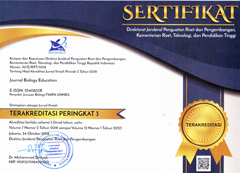The Environmental Caring Character through Biology Learning in Senior and Junior High School
Abstract
This study aims to describe the role of teachers in the planting of environmental cares through biological learning. The study was designed using case study of descriptive-qualitative approach. Research respondents were principals, science and biology teachers, and students in SMP Negeri 1 Batang and SMA Negeri 1 Gringsing. The results show that biology teachers inculcate environmental caring characters that are explicitly present in the syllabus and RPP. Master modeled care for the environment by maintaining the cleanliness of the teachers 'and bathrooms' room. Teachers give response in the form of reprimand / punishment and appreciation (gratitude and praise) to the students related to environmental care. Students carry out cleanliness pickets, conserve electrical energy, and make skills assignments from used goods. It is concluded that teachers play a very important role in the planting of environmental cares. The planting of environmental cares has not been fully integrated in biology learning at SMP Negeri 1 Batang and SMA Negeri 1 Gringsing. Dumpster has not been effectively functionalized. Teachers have not done classroom and drawer hygiene monitoring. The character of environmental care owned by junior high and high school students has not been maximized. There are still some students who throw garbage in drawers, play water, and buy bottled drinks. Based on the conclusions, it is recommended that teachers should instill an environmentally careful character education, streamline waste disposal, teachers conduct classroom cleaners and drawers, and require sanctions for non-compliant students.
The copyright of the article once it is accepted for publication shall be assigned to the journal as the publisher. The intended copyright includes the right to publish the article in various forms (including reprints). The journal maintains the publishing rights to the published articles.
This work is licensed under a Creative Commons Attribution 4.0 International License.







